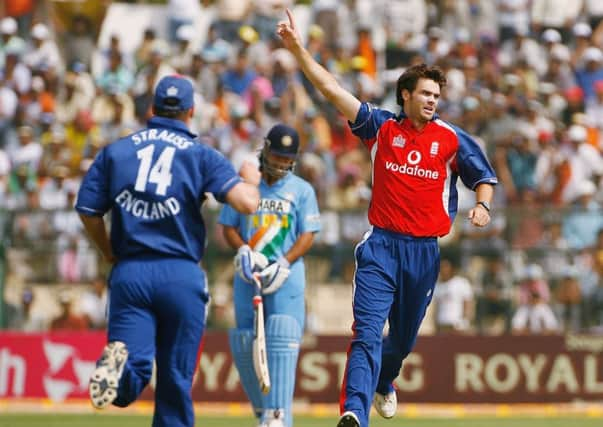Allan Massie: England relying too much on Anderson


The batting one may be fixed if Gary Ballance and Ian Bell, returning to county cricket for a couple of matches, find form and make runs. Bell has had a dreadful time since he made a hundred in the first Test against the West Indies, and for the moment looks like a walking wicket.
These things happen, some-times, even to the best players. In Australia in 1950-51 Denis Compton, one of England’s greatest batsmen of all time, made a total of 53 runs in an Ashes series. Returning home he hit a century in the first Test against South Africa.
Advertisement
Hide AdAdvertisement
Hide AdIf Bell makes a couple of decent scores for Warwickshire, he will probably be all right. If he doesn’t, then his selection for the first match against Australia in Cardiff will be a case of hope rather than expectation.
Much the same may be said of Ballance, who has followed a great start in Test cricket with a succession of low scores. His ill-judged call which led to Adam Lyth’s run-out in the first innings at Headingley suggests that his mind is unsettled.
The bowling is more worrying, because, especially with Alastair Cook making runs again, the rest of the batting looks all right. (Joe Root can be excused his double failure at Headingley; he was due a bad match.)
The bowling depends too much on Jimmy Anderson. He is a great new-ball bowler, almost always getting one of the openers out cheaply, and a match-winner if the ball is swinging. But if it isn’t, then he is sometimes quite ordinary. Stuart Broad is taking wickets again, but bowling far too many bad balls and conceding too many runs. Mark Wood and Ben Stokes are both inexperienced. They bowl wicket-taking balls, but don’t establish control. England badly need a seam bowler like Australia’s Ryan Harris or the West Indies’ Jason Holder who goes at little more than two an over.
With all the talk of attacking cricket, it is still true that there are times when the fielding side must practise containment, slowing the scoring rate and testing the batsman’s patience. This means bowling on one side of the wicket to a field set to deny the batsman easy runs.
Then there is the spin problem. Moeen Ali had a very good – unexpectedly good – series against India last summer, but he bowled badly in the West Indies and in both New Zealand Tests. He doesn’t seem to know where the ball is pitching and therefore can’t bowl a consistent line and length. So, though he may take wickets, he can’t at present do the sort of holding job that Ashley Giles did for Michael Vaughan in 2005. If Cook can’t rely on Moeen to bowl ten or 15-over spells, he is in trouble.
There are few alternatives because the structure of the county season means that spinners are under-bowled.
There is no off-spinner or slow left-hander likely to do a better job than Moeen. The Yorkshire leg-spinner Adil Rashid is the only obvious alternative. There are doubts about him. The English management seemingly think he bowls too slowly – though bowlers themselves are usually the best judge of how they should bowl. He tends to go for runs and doesn’t often trouble the best batsmen. But he has taken almost 400 first-class wickets, more than twice as many as Moeen, and in county cricket he is very effective against the lower order.
Advertisement
Hide AdAdvertisement
Hide AdGiven England’s recent difficulties in finishing off an innings, a bowler who can take the last three or four wickets of an innings quickly and cheaply is surely worth trying. I would imagine that the England selectors are keeping an eye on how the West Indian leg-spinner, Davendra Bishoo, does against Australia. He too is slow through the air, and his overall Test record is not great, but he is a better bowler than when he first played Test cricket, and he dismissed Michael Clarke on Wednesday, taking six Australian wickets in their first innings. If he continues to do well against the Aussies, then the case for picking Rashid is strengthened.
England missed too many catches against New Zealand. It’s hard to take 20 wickets in a Test match; harder still if you spill three or four catches an innings. Adam Lyth’s Yorkshire record suggests he is perhaps the best slip fielder in England, but he didn’t field in the slips against New Zealand; very odd.
Alastair Cook leads from the front, and is evidently respected as a captain by his team. But as a fielding captain he is less convincing. England either have a very attacking field, or, if batsmen are set, one which is spread wide.
There’s a case for setting a field which makes it difficult to take singles. Like many captains today Cook seems to labour under the delusion that runs to third man don’t count. Giving a batsman a four down to third man always seems a bad idea to me.
As England’s captain, Len Hutton nearly always had a third man and a long leg for his fast bowlers, Frank Tyson and Brian Statham, partly perhaps because, as an opening batsman, he knew how satisfying it was to get a boundary from an edged stroke.
So much of cricket is played in the mind, but too often at present England are losing the mind games. Unless they learn to win them, they will lose the Ashes, perhaps heavily.